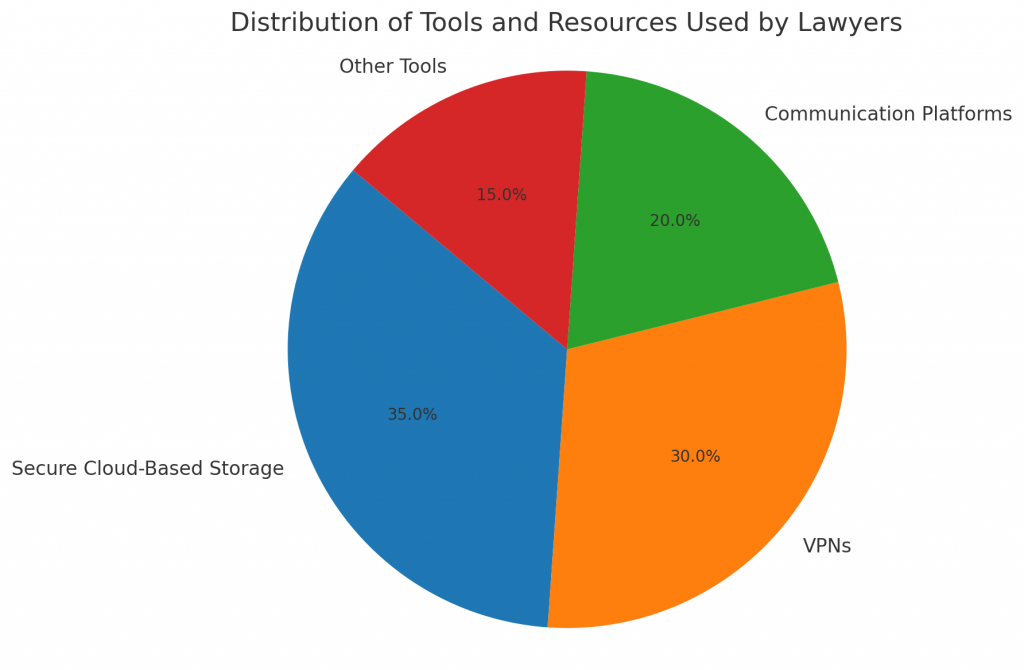Legal Guidance in Remote Social Media Work: Why Lawyers are Indispensable
The pandemic has pushed many professionals, including lawyers, to adapt to remote work – but how do they navigate the complexities of legal practice in the digital realm? In fact, according to the American Bar Association’s recent guidance on virtual practice, attorneys must take active measures for client confidentiality and ensuring a competent representation.
This article aims to delve into the unique role of lawyers in remote social media work, offering useful tips and precautions that align with ethical standards. Let’s decode this new facet of practicing law in our increasingly virtual world!
Key Takeaways
- Lawyers must effectively communicate changes in workflow and case updates to clients and colleagues when transitioning to remote work.
- Setting up remote access to cases and documents is crucial for smooth operations in remote law practice. This includes utilizing secure cloud-based storage systems, VPNs for accessing internal databases, and implementing systematic file naming methods.
- Building a positive remote experience for clients involves clear communication channels, setting expectations, and utilizing cloud-based document management systems to ensure confidentiality.
Transitioning to Remote Work as a Lawyer
Transitioning to remote work as a lawyer involves effectively communicating changes with clients and colleagues, setting up remote access to cases and documents, and ensuring a positive remote experience for clients.
Communicating changes with clients and colleagues
Transitioning to remote work requires ample communication with clients and colleagues. Clarity becomes paramount when conveying changes in workflow, meeting schedules or case updates.
This communication isn’t a one-way street; open lines for feedback and queries are crucial. Updating clients about the status of their legal matters in simple, understandable language enhances trust.
We need to ensure we pass accurate information while respecting client confidentiality rules outlined in Model Rule of Professional Conduct 1.6. Technology such as secure email platforms and encrypted messaging apps can be used effectively for these purposes.
Remember that conferencing tools allow group meetings where lawyers can discuss cases without breaching client privacy or duty of confidentiality norms set by Formal Opinion 498 “Virtual Practice”.
It’s equally important to share these alterations with team members as they too need to adapt seamlessly into this new mode of operation.
Lawyers having managerial authority should also establish firm policies surrounding this shift ensure subordinate attorneys and non-lawyer assistants adhere to ethical guidelines designed by The American Bar Association’s Standing Committee on Ethics and Professional Responsibility.
Setting up remote access to cases and documents
Gearing up for a successful transition to remote law practice calls for thoughtful setup of remote access to cases and documents. Here is how you can achieve this:
- Begin by identifying the legal documents that you routinely use. This includes legal contracts, briefs, and other necessary case files.
- Invest in a secure cloud – based document storage system. These systems allow legal professionals to store, retrieve, and share important documents while ensuring data protection.
- Opt for a Virtual Private Network (VPN) to access your firm’s internal database securely while working remotely.
- Establish a systematic naming and filing method for easy navigation of files. This can play a key role in maintaining work efficiency.
- Make sure your technological tools are regularly updated with the latest security protocols to protect client information from potential cyber threats.
- Train team members on correct procedures for managing digital files to ensure everyone maintains professional standards of client confidentiality.
- Think about incorporating e – signature functionalities into your system to facilitate seamless signing of legal documents remotely.
Preparing a positive remote experience for clients
Switching to remote work requires legal professionals to build a new framework for client interaction. Legal meetings can smoothly transition from in-person to digital platforms, allowing lawyers to consult and advise clients without geographical constraints.
It’s paramount that the lawyer ensures confidentiality during these virtual interactions, as clients’ sensitive information should not be accessed by anyone but the lawyer themselves.
Cloud-based document management systems are instrumental in achieving this goal, making file sharing more secure and efficient. A key component of preparing a positive remote experience is establishing clear communication channels and setting expectations at the onset of every case—this includes response times, means of contact, and how often updates will be provided.
This level of transparency fosters trust between lawyer and client in a remote setting enhancing their working relationship while upholding ethical standards laid out in Formal Opinion 498.
Essential Tools for Remote Law Practice
To effectively practice law remotely, lawyers need essential tools such as a reliable laptop and internet connection, a scanner and cloud-based document storage, a secure client portal, and a video meeting program.
Laptop and Internet Connection
In conducting remote law practices, a laptop and internet connection serve as pivotal tools. They provide the backbone for all communication and processing of legal documents in real-time, thus improving the work-life balance for lawyers.
With a secure internet connection, legal professionals can access critical cases no matter where they choose to work from. Whether drafting contracts or performing comprehensive legal research, these digital devices help streamline tasks while ensuring maximum productivity.
The global pandemic pushed many into this new era of remote working – significantly changing the legal profession’s traditional norms – with laptops and robust internet connections leading the charge towards efficient virtual practice.
Scanner and Cloud-based Document Storage
A scanner is a must-have tool for lawyers practicing remotely as it allows them to convert physical documents into digital files. This enables easy access and retrieval of important legal documents without the need for bulky paper files.
Cloud-based document storage systems further enhance remote work efficiency by providing a secure and easily accessible repository for all legal files. These platforms ensure that lawyers can access their documents from anywhere with an internet connection, making collaboration with colleagues and clients seamless.
By embracing scanners and cloud-based document storage, law professionals can streamline their workflows, increase productivity, and stay organized in the digital age of remote work.
The use of scanners and cloud-based document storage also aligns with the ongoing digital transformation in the legal industry. As more firms embrace technology, these tools help expedite processes while reducing reliance on physical paperwork.
Additionally, cloud-based storage solutions offer robust security features to protect sensitive client information, ensuring compliance with ethical standards regarding confidentiality.

Secure Client Portal
Secure client portals are a vital tool for lawyers practicing remotely. These portals allow for efficient communication and seamless document sharing and collaboration. With secure client portals, lawyers can enhance client collaboration and enable remote teamwork with colleagues.
They play a crucial role in enhancing communication and collaboration within the modern legal landscape. Additionally, secure client portals provide a secure storage solution, allowing easy access to important legal documents through cloud-based platforms.
This ensures that confidential information is protected while still providing convenient access for both lawyers and clients.
Video Meeting Program
Video meeting programs are essential tools for remote law practice. These programs facilitate efficient communication and collaboration among legal professionals, enabling seamless document sharing and remote teamwork.
With video meetings, lawyers can enhance client collaboration by providing a convenient way for clients to seek legal advice or discuss case details. In the modern legal landscape, virtual collaboration is an indispensable aspect that allows lawyers to connect with clients and colleagues from anywhere in the world.
The Role of Social Media in Remote Law Practice
Social media plays a crucial role in remote law practice, enabling lawyers to enhance client engagement, engage in legal marketing and lead generation, and provide online legal advice and training.
Enhancing client engagement
Virtual collaboration in remote law practice not only allows lawyers to work efficiently but also enhances client engagement. By leveraging technology and communication tools, lawyers can stay connected with their clients in real-time, ensuring that they receive timely updates on their cases.
This increased accessibility creates a stronger sense of trust and transparency between the lawyer and the client. Communication channels such as videoconferencing enable face-to-face interactions without the need for physical meetings, making it easier for clients to participate in discussions and provide feedback.
Additionally, cloud-based document management systems allow for seamless sharing of documents and information, enabling faster response times from both parties. Overall, enhanced client engagement through virtual collaboration strengthens relationships and ensures that clients feel supported throughout the legal process.
Furthermore, social media platforms play a crucial role in enhancing client engagement remotely. Lawyers can use these platforms to share valuable legal insights, answer frequently asked questions, and foster an online community where clients can interact with each other.
By providing valuable content through social media channels, lawyers can demonstrate their expertise while also establishing themselves as trusted advisors in the eyes of potential clients.
This active presence on social media helps build brand awareness and increases visibility within targeted audiences who may be seeking legal services or advice. Through regular interaction on social media platforms, lawyers can engage with current clients effectively while attracting new ones by showcasing their knowledge and commitment to delivering exceptional service.
Legal marketing and Lead generation
Lawyers working remotely can leverage the power of social media to enhance their legal marketing strategies and generate leads. Platforms like LinkedIn, Twitter, and Facebook provide opportunities for lawyers to connect with potential clients and establish their expertise in specific legal areas.
By showcasing professional accomplishments, sharing valuable legal insights, and engaging with their audience through social media, lawyers can attract new clients and build a strong online presence.
However, it is crucial for lawyers to exercise caution when using social media to ensure compliance with confidentiality rules and protect client confidences. Additionally, given the importance of social media evidence in modern litigation, lawyers need to be mindful of how they obtain and use information from these platforms.
Providing online legal advice and training
Lawyers are increasingly leveraging social media to provide online legal advice and training. This allows them to reach a wider audience and offer their expertise in a convenient and accessible way.
Through platforms like YouTube, lawyers can create informative videos on various legal topics, providing guidance on common legal issues or explaining complex legal concepts. Additionally, they can host webinars or live Q&A sessions on social media platforms where individuals can ask questions and receive real-time responses from lawyers.
By harnessing the power of social media, lawyers are able to expand their reach and make valuable legal information more readily available to those who need it.
Ethical Considerations for Lawyers Using Social Media
When using social media, lawyers must be careful to maintain client privacy and confidentiality, navigate legal advertising rules, and avoid the unauthorized practice of law.
Maintaining client privacy and confidentiality
Lawyers have a crucial duty to protect the privacy and confidentiality of their clients. To uphold this responsibility, they must take steps to ensure that client information remains secure when working remotely.
Lawyers should be cautious about where confidential meetings or discussions take place and avoid situations where others can overhear or see client-related information. This includes making sure that conversations are not overheard by family members, colleagues, or anyone else who may compromise the attorney-client privilege.
It is especially important to be mindful of children and teenagers who might inadvertently share confidential information on social media platforms. By implementing these measures, lawyers can maintain the trust and confidence of their clients while upholding their ethical obligations.
To further safeguard client privacy, legal professionals should also stay informed about potential risks associated with remote communication platforms. The FBI has issued warnings about “Zoom-bombing” incidents during teleconferences, emphasizing the need for precautions against unauthorized access to video meetings.
Navigating legal advertising rules
Lawyers must navigate legal advertising rules when using social media for marketing and lead generation. They need to be aware of the American Bar Association’s Formal Opinion 498, which addresses lawyer competence, client confidentiality, and supervision in virtual practice.
Lawyers have a duty to maintain client confidences and protect their privacy when discussing legal topics on social media platforms. It is essential for attorneys to establish policies and procedures that ensure compliance with ethical rules regarding advertising and avoid any unauthorized disclosure of client information.
Avoiding unauthorized practice of law
Lawyers must exercise caution to avoid engaging in unauthorized practice of law when using social media. While social platforms offer opportunities for lawyers to share legal information and connect with clients, they need to be mindful not to provide specific legal advice through these channels.
It is important for lawyers to protect client confidences, adhere to professional conduct rules, and maintain confidentiality and privacy concerns when discussing legal topics on social media.
Additionally, lawyers should refrain from contacting represented individuals or engaging in pretextual contact through social networking websites. By being aware of these ethical considerations, lawyers can navigate the use of social media while upholding their professional responsibilities.
Examples of Successful Remote Law Practices
Vanst Law, Vela Wood, and PersanteZuroweste are three examples of successful remote law practices that have thrived in the digital age. Find out how these firms have embraced remote work and leveraged social media to engage clients and grow their businesses.
Read more on our blog!
Vanst Law

Vanst Law is a prime example of a successful remote law practice that utilizes social media to its advantage. With a focus on immigration law, Vanst Law has built an impressive online presence through various platforms like Facebook, Instagram, and YouTube.
By regularly sharing informative content about immigration processes and updates, they have been able to enhance client engagement and establish themselves as trusted legal professionals in their field.
The attorneys at Vanst Law also use social media for legal marketing and lead generation. By leveraging targeted ads and creating compelling content, they are able to attract potential clients who are in need of their services.
Vela Wood
Vela Wood is one example of a successful remote law practice. They are part of the digital transformation revolutionizing the legal industry. As a virtual law firm, Vela Wood offers advantages such as reduced overhead costs and the ability to assemble specialized teams.
They are associated with successful remote law practices, like Vanst Law and PersanteZuroweste. Vela Wood is at the forefront of embracing remote work in the legal profession.
PersanteZuroweste
PersanteZuroweste is a prime example of a law firm that has successfully transitioned to remote work. They were able to navigate the challenges of Hurricane Irma by relocating their entire team to a large Airbnb in another city, prioritizing the safety of their young children.
This demonstrates that working remotely as a lawyer is not only feasible but also profitable. The firm utilized Clio’s cloud-based practice management system, allowing them to access cases and documents from anywhere with an internet connection.
By embracing remote work, PersanteZuroweste showcases how lawyers can adapt and thrive in today’s digital landscape.
Future of Remote Work in the Legal Industry
The future of remote work in the legal industry looks promising, with the emergence of virtual law firms and advancements in technology facilitating seamless remote lawyering.
The emergence of virtual law firms
Virtual law firms are on the rise in the legal industry as remote work becomes more prevalent. These firms operate entirely online, allowing lawyers to provide their services from anywhere in the world.
The COVID-19 pandemic has acted as a catalyst for this trend, with many lawyers now working remotely and supervising other attorneys virtually. Advancements in technology have made it possible for virtual law firms to thrive, offering benefits such as reduced costs, elimination of geographical barriers, and the ability to assemble specialized teams tailored to specific legal needs.
With the American Bar Association providing guidelines on ethical considerations for remote work and resources available to address security risks of virtual meetings, these emerging firms are poised to reshape the way legal services are delivered.
Technological advancements facilitating remote work
Technological advancements have played a crucial role in facilitating remote work for lawyers. With the availability of reliable internet connections and powerful laptops, legal professionals can easily access their cases and documents from any location.
Cloud-based document storage systems ensure that important files are securely stored and accessible to authorized individuals. Video meeting programs have become invaluable tools for conducting virtual meetings with clients and colleagues, eliminating the need for in-person interactions.
Additionally, artificial intelligence and machine learning technology are being adopted in the legal industry to enhance research capabilities and automate repetitive tasks, further streamlining remote work processes.
Benefits and challenges of remote lawyering
Remote lawyering offers numerous benefits and also comes with its fair share of challenges. One major benefit is the flexibility it provides, allowing lawyers to work from anywhere at any time.
This not only promotes better work-life balance but also enables them to cater to clients across different time zones. Additionally, remote work eliminates the need for a physical office space, reducing overhead costs for law firms.
However, there are challenges as well. Remote lawyering requires strong communication skills and effective use of technology tools for seamless collaboration with colleagues and clients.
Furthermore, ensuring confidentiality and protecting sensitive client information becomes crucial when using virtual meeting platforms or social media platforms for communication purposes.
Conclusion
Lawyers are adapting to the demands of remote work by leveraging social media platforms in innovative ways. From enhancing client engagement to providing online legal advice, lawyers are harnessing the power of social media for their professional growth.
As the legal industry continues to evolve, lawyers who embrace remote work and leverage social media will be well-positioned for success in this digital age.
